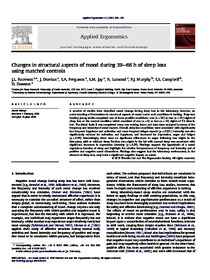Changes in structural aspects of mood during 39-66 h of sleep loss using matched controls

Paterson, John L. ; Dorrian, Jillian ; Ferguson, Sally A. ; Jay, Sarah M. ; Lamond, Nicole ; Murphy, Pamela J. ; Campbell, Scott S. ; Dawson, Drew
2011
42
2
196-201
mental health ; sleep deprivation ; working time
Working time and leave
English
Bibliogr.
"A number of studies have described mood change during sleep loss in the laboratory, however, an understanding of fluctuations in structural aspects of mood under such conditions is lacking. Sixty-two healthy young adults completed one of three possible conditions: one (n = 20) or two (n = 23) nights of sleep loss or the control condition which consisted of one (n = 9) or two (n = 10) nights of 9 h time in bed. The Mood Scale II was completed every two waking hours and data were analysed in terms of the frequency and intensity of mood reports. Overall, sleep loss conditions were associated with significantly less frequent happiness and activation and more frequent fatigue reports (p < 0.001). Intensity was also significantly reduced for activation and happiness, and increased for depression, anger and fatigue (p < 0.05). Interestingly, there were no significant differences in anger following two nights in the laboratory with or without sleep. Further, two nights in the lab with normal sleep was associated with significant increases in depression intensity (p < 0.05). Findings support the hypothesis of a mood regulatory function of sleep and highlight the relative independence of frequency and intensity and of positive and negative mood dimensions. Findings also suggest that the laboratory environment, in the absence of sleep loss, may have a significant negative impact on mood."
Digital
The ETUI is co-funded by the European Union. Views and opinions expressed are however those of the author(s) only and do not necessarily reflect those of the European Union or the ETUI.